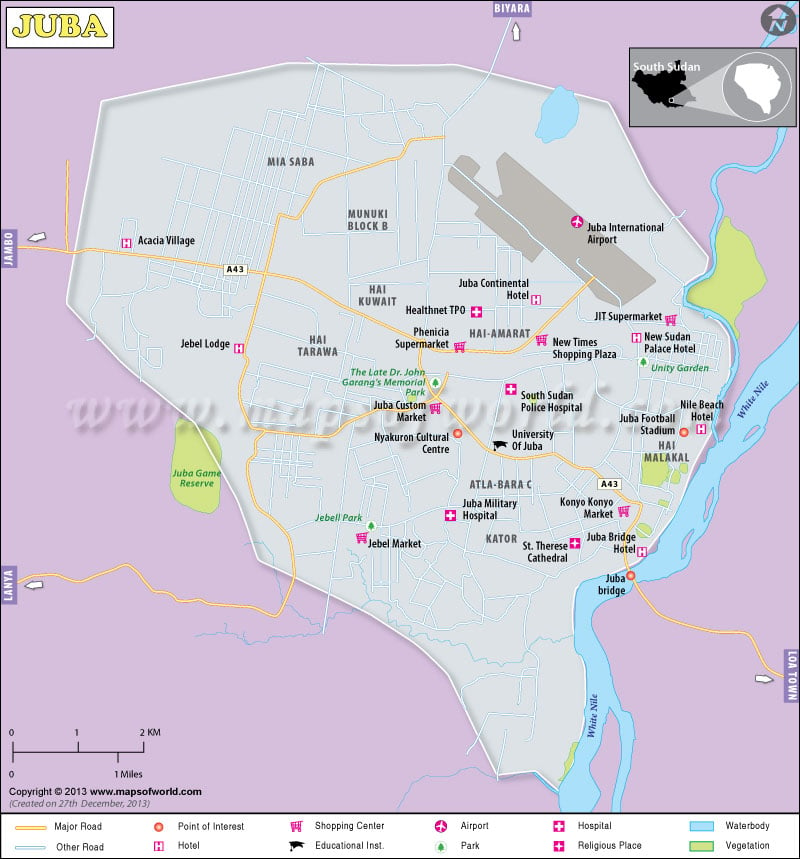Facts About Juba |
|
|---|---|
| Country | South Sudan |
| State | Equatoria |
| Founded | 19th Century |
| Area | 22,956 km² |
| Population | 372410 |
| Lat Long Coordinates | 4°51′N31°36′E |
| Time Zone | (UTC+3) |
| area Code | +211 – 811 |
| Language | English, Bari, Dinka, Murle, Nuer, Zande |
| Major Religion | Christianity, and Islam |
| Point of interest | Gondokoro, University of Juba, Kuwaiti mosque |
About City :
Juba is the capital of the Republic of South Sudan as well as the capital of the state of Central Equatoria. Home to over 370,000 people, the city is also the administrative center of the country. It is a river port and serves as the agricultural commercial center in the area. Juba Arabic and English are the prevalent languages here.
The country was originally a part of Sudan and the separation took place in 2011. As a part of Sudan, it was under the colonial rule of Britain and Egypt from 1899. The British Empire had hoped to join this area to the country of Uganda but the Juba Conference of 1947 resolved to unify the northern and southern area of Sudan into one nation. The unification resulted in the outbreak of two Civil Wars and Juba was the center of the two battles. In 2005, the city was declared as the capital of the newly formed Autonomous Government of Southern Sudan. In 2011, the Republic of South Sudan was formed and Juba was established as its capital.
Geography :
The city lies to the west of the River Bahr al-Jabal at a distance of 140 km to the south of Bor. Mountain Nile is situated to the east of the city and Uganda lies to the south of the city. The River Nile flows right through the city. The city sprawls on an area of over 50 sq km and is at an elevation of 550 m.
How to Reach (Transport) :
Juba is served by the Juba Airport which is located on the west banks of the River Nile. Airlines like Nasair, Fly Dubai, Air Uganda and Sudan Airways operate several flights to and from cities like Cairo, Dubai, Asmara, Khartoum and Entebbe.
The city is also accessible from Kampala which operates daily buses to and from Juba.
Inside the city, boda bodas or motorbike taxis are the fastest yet not the safest way of traveling. Cars are a safer option and are readily available all throughout the city.
When to Visit :
Juba features a tropical climate and is hot and humid all throughout the year. From April to October, the city experiences its rainy season with the average precipitation being quite over 100 mm. From November to May, although there is little or almost no rainfall, temperatures can rise up to 40 degree Celsius. Despite this, the best time to visit is from November to May due to the relatively dry weather.
Fairs and Festivals :
As a newly established independent nation, the country celebrates mostly religious and traditional festivals. Some of them are as follows:
- Independence Day, celebrated on 1st January every year, is a national holiday. Several parades are held all over the city.
- European Film Festival, founded in 2012, is an annual film festival highlighting the cinematic brilliance of several film industries including those of France, Germany and Italy.
- Muslim festivals of Eid, Muharram and Ramadan are also celebrated with great pomp here.
- Christian religious festivals like Easter and Christmas also have much importance.
Points of Interest (Places to Visit) :
Juba has very few sights as most of the city is still developing. The following are the places recommended for a visit:
- Juba Nile River Bridge, reopened in January 2012, plays a very critical role in connecting the capital to Uganda and Kenya.
- Dr. John Garang Mabior’s Mausoleum is an important building in South Sudan. It is dedicated to the former President and is an imposing piece of architecture.
- Cathedral of All Saints, founded in 1959, is located on the banks of River Nile. It is the home of the Archbishop of Sudan and South Sudan.
- Other places to visit are the Avenue of Nations and the University of Juba. A boat ride on the Nile is also popular among tourists.
Accommodation :
Most hotels in Juba are of the mid range and the city also has two camps for the budget traveler. Mango Camp and Oasis Camp are cheap, provide free wireless internet and also have gyms.
Acacia Village is the most popular accommodation option here with services like a tennis court, a restaurant, air conditioned rooms and a swimming pool. Juba Bridge Hotel and Bros Hotel offer comfortable services and surroundings and also have a brilliant view of the Nile. Beijing Hotel, Hamza Inn and Holiday Hotel are some of the other popular accommodations in the area.

 South Sudan Facts
South Sudan Facts